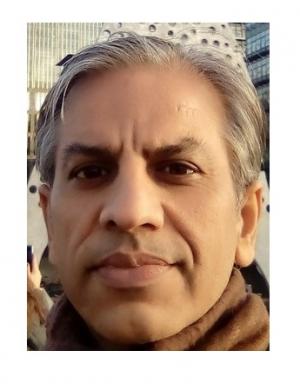Narula, Kapil | India

Kapil’s career goal is to “provide a leadership role to the world, onto a path of sustainable development”. He is currently a Post Doctoral Researcher in Energy Efficiency at Institute for Environmental Sciences, University of Geneva.
Kapil has a PhD in Development Studies (focus on energy economics, sustainability and policy). He also has an advanced university degree in Electrical Engineering and a first level degree in Engineering and Science. He has a wide range of work experience in the industry, academics, research and he was a participant of the Young Scientist Sumer Program (YSSP) at IIASA, Vienna. His past research on energy includes energy security, energy modelling, energy policy and decarbonisation of heating.
His other area of expertise is the maritime domain and he has worked on Blue Economy, maritime sustainability, shipping emissions and ocean governance. He was a Commonwealth Professional Fellow at UCL, London where he worked on GHG reduction in shipping. He was also a Research Fellow at Project Drawdown and is an Honorary Adjunct Fellow at the National Maritime Foundation.
Kapil is the author/editor of seven books on energy and maritime issues and is on the Editorial Board of the various academic journals. As an emerging leader in the field of energy and sustainability, he intends to put his ideas into practice for furthering sustainable development. His selected academic work can be accessed here.
Project at IAS-STS: Policies for heat decarbonisation in Austria (Heat Decarb)
Energy use contributed to about 75% of global GHG emissions in 2015. On one hand, heating contributed to more than 50% of the global energy end use and on the other hand, less than 10% of heat was provided by modern renewable energy sources. Hence, a large effort is required to decarbonise heating supply. The EU is likely to adopt the target of net zero emissions by 2050 under the proposed EU climate law as a part of the European Green Deal and all Member States have framed policies for improving energy efficiency as well as increasing the share of renewable energy for heating.
In the light of the above context, the overall aim of this research project is to examine existing policies for heat decarbonisation in the EU (and specifically in Austria). Some of the important questions which will be answered with regards to decarbonising the residential heating sector are: Which policy instruments are effective and in which context?; Which policies should be adopted and what would be an effective policy bouquet?; and What lessons can be learnt from existing (and planned) policies in Austria?
This research will be informed by the ongoing work on decarbonising heating at the Swiss Competence Center for Energy Research (SCCER) - Center for Research in Energy, Society and Transition (CREST) at the University of Geneva. It will also feed into GenEx (University of Geneva and Exeter, UK) joint seed funding on “Policies for decarbonising residential heating in Switzerland and the UK at the time of a climate emergency”.
Contact: kapilnarula74
 gmail [punkt] com, Skype: kapilnarula74
gmail [punkt] com, Skype: kapilnarula74
Selected Publications
Book:
Narula, K., (2019). The Maritime Dimension of Sustainable Energy Security
ISBN 978-981-13-1589-3. Singapore: Springer.
Publications in refereed journals:
- Narula, Kapil, Jonathan Chambers, Kai N. Streicher, and Martin K. Patel. 2019. “Strategies for Decarbonising the Swiss Heating System.” Energy 169 (February): 1119–31. https://doi.org/10.1016/j.energy.2018.12.082.
- Narula, K, and B S Reddy. 2016. “A SES (Sustainable Energy Security) Index for Developing Countries.” Energy 94: 326–43. https://doi.org/10.1016/j.energy.2015.10.106.
- Narula, K, and B S Reddy. 2015. “Three Blind Men and an Elephant: The Case of Energy Indices to Measure Energy Security and Energy Sustainability.” Energy 80: 148–58. https://doi.org/10.1016/j.energy.2014.11.055.
- Narula, Kapil, Yu Nagai, and Shonali Pachauri. 2012. “The Role of Decentralized Distributed Generation in Achieving Universal Rural Electrification in South Asia by 2030.” Energy Policy 47: 345–57. https://doi.org/10.1016/j.enpol.2012.04.075.
